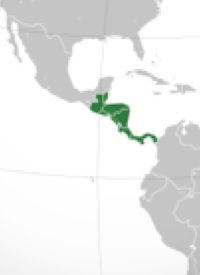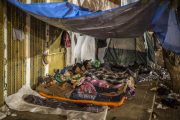
The Times story included an account of a young teacher gunned down when gunmen opened fire on a park, and claimed it was the second such massacre since November in the town of San Pedro Sula, Honduras, mirroring events in such Mexican cities as Ciudad Juarez and Monterrey where drug wars claim lives on a weekly basis. The Honduran murder rate has climbed to 66.8 per 100,000 people, the worst in Central America. According to the Times: "Five of Central America’s seven countries are on the United States’ list of 20 ‘major illicit drug transit or major illicit drug producing countries.’ Three of those, Costa Rica, Nicaragua, and Honduras, were added just last year."
Drug cartel leaders from Mexico have taken over from Colombians, recruiting locals and increasing consumption. Activities like extortion and kidnapping rings are developing similar to those in Mexico. A major cocaine-processing lab was also discovered this month in Honduras, taking the country from just a drug way station to a manufacturing locale.
The Times continued, quoting José María Tijerino Pacheco, minister of public security in Costa Rica, two countries away from Honduras, “Without immediate help, the region is going to degenerate into another Mexico.”
Borderland Beat reported on March 23 that the government of Guatemala, neighbor to Honduras, declared a state of emergency December 19 in the northern Alta Verapaz province bordering Mexico, and deployed the army in a bid to retake cities lost to the Zetas.
And the Salvadoran attorney general, Romeo Barahona, said, "Mexican organized crime is a threat in all of Central America."
Single engine planes use remote, uninhabited rainforests for smuggling, and planes, often stolen, are sometimes burned or abandoned. Boats utilize multiple major shipping lanes to bring drugs across the Caribbean from South American, and also the Pacific Ocean on the west, overwhelming strained resources.
Cartels have been buying fishing businesses, farms, boats, and other modes of transport, sometimes through coerced transactions, in an effort to move and hide cocaine. Pastor Reyes González, commander of the small Coast Guard base in Puntarenas, Costa Rica, said guardsmen admit they are outmatched. “It’s extremely frustrating. There is not much we can do.” Only one of his three large boats has a functioning engine and the smaller ones are too slow to catch cartel boats.
The country’s 801-mile coastline is effectively unprotected because of a lack of equipment.
In addition, the region has suffered another blow since smugglers began paying local dealers in kind. These then convert the cocaine payments into cash. Treatment centers are now overwhelmed with addicts, the number doubling each year.
The father of the young murdered teacher summed up the despair some Central Americans feel, “It is not easy to have hope. What we have is desperation, anguish and fear."
President Obama has promised help to the struggling region, but in one instance that help had an unintended consequence. An alarming fact was revealed in another Borderland Beat report,
The traffickers are benefiting from the U.S.-financed construction of a major roadway across northern El Salvador. It’s part of a $461-million project sponsored by Millennium Challenge Corp., a U.S. government initiative to spur development in poor countries. The new highway widens to three or four lanes in places as it slices through steep hills that were arduous to cross during the civil war. Engineers are still working on steep retaining walls and terraced banks.
On Tuesday, during his three-country five day tour to the region, Obama promised $200 million to the anti-drug fight in Central America:
We are launching a new effort against gangs in Central America to support efforts here in the region … including the social and economic forces that drive young people toward criminality.
He said it would help train security forces, strengthen courts and tackle underlying poverty.
But Americans are increasingly fed up with empty promises and foreign aid that backfires. The Mexico/Central America situation serves to point once again to the need to secure our own border and stop the flow of taxpayer dollars across the border.


